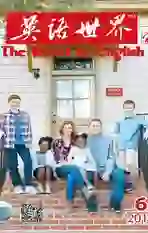Julie (Excerpt III)《朱莉》(节选三)
2019-09-10琼·克雷格黑德·乔治吴文安
琼·克雷格黑德·乔治 吴文安
He looked up and smiled. Julie looked up too. A solitary bull was running toward them. She glanced at her father. Kapugen did not seem alarmed, and sure enough, when the bull was only a few yards away, he stopped. He ogled them. Shreds of qivit trailed from his shoulders.
The bull was massive but not very tall. He barely came up to Kapugen’s chest. His huge neck muscles formed a hump on his back that was higher than his head. His tail was remarkably short, his hair so long it swept the ground like a skirt. His feet were enoumous ice choppers. A bold boss of horn, curved tips pointed forward, met in the middle of his forehead like a helmet. The chuncky rocklike animal bore a strong resemblance to the wooly mammoths of the past. He snorted.
“One of the last old-time animals,” Kapugen said. “White men say he is a goat-antelope. To the Eskimo he is uminmak, the animal born to the ice and the wind and the snow.” Kapugen held out a bilberry stalk to him. “Once,” he went on, “there were millions of uminmaks in northern Alaska. When the Eskimo got guns, they shot them all. Every one.
“The U.S. government tried to bring them back. They got thirty-three calves from Greenland and set them free on Nunivak in 1930. When that herd was large, they brought some calves to Fairbanks and later set them free. We have a few wild ones on the North Slope now.
“The government helped me bring bull and cow calves to Kangik to start a qivit industry.”
The bull snorted and pawed the ground, then rubbed his head against his foreleg.
“Is he angry?” Julie asked.
“He is rubbing a gland near his eye on his leg. The scent from the gland warns the herd. It is not musk, as the white man calls it. It smells fresh and clean, like snow.
“What is he afraid of?” Julie asked.
“He is prey,” Kapugen said. “He is concerned about all things; you, me, our guns, and the odors on the wind.” Kapugen sniffed and squinted into the glaring snow. “He is saying the grizzly bear is awake.”
“The grizzly bear?” Julie asked.
“Aklaq awakened last week in a warm spell,” he said. “She has two yearling cubs and they are hungry. She has been staying close to the musk oxen, all right,” he said. “That is not good. Like the wolf, the grizzly can kill an uminmak. Uminmak is smaller than a bear and not very bright.”
Kapugen cupped his hands behind his ears.
“The herd is coming,” he said, and smiled proudly. Out of a bright spot of ice glare the other musk oxen appeared, rolling along as if on wheels and seemingly pushed by the wind. They were a sturdy, well-knit group. The beasts slowed down, hesitated, then circling like whirlpool, forced the yearlings and calves into the center of their group for protection.
卡普根抬起头,面露微笑。朱莉也抬头看。有一头公麝牛独自朝他们跑了过来。朱莉瞥了一眼父亲。父亲好像一点也不惊慌。看来真的不须惊慌,因为那头牛在几码远的地方就停住了。他深情地望着这父女俩。一绺绺的麝牛绒从肩上披散下来。
这头公牛体型宽大,但个头不高,刚刚够到卡普根的胸口。他颈部的肌肉粗壮,在背上形成肉坨,比头还要高。他的尾巴出奇地短,毛发却很长,拖在地上,就像裙子。而他的脚掌恰似碎冰機一样宽大。弧形的牛角尖朝前伸,粗壮的牛角根部在前额中间会合,像是头盔。这种矮矮胖胖壮如小山的动物像极了远古时代毛发纷披的猛犸象。这时公牛打了个响鼻。
“这是我们最后的远古动物之一,”卡普根说,“白人称他们为山羚羊。对爱斯基摩人来说,他们是尤敏麦克,是专为冰雪和寒风而生的动物。”卡普根一边说着一边拿起一根覆盆子茎秆递给公牛。卡普根接着讲:“曾几何时,阿拉斯加北部有几百万头尤敏麦克。但爱斯基摩人有枪的时候,就把他们都打死了。一个不剩。
“美国政府想让麝牛回到本土。1930年,他们从格陵兰岛买了33头小麝牛,然后在努尼瓦克岛放生。牛群足够大的时候,他们又把一些小麝牛带到费尔班克斯,稍后也放生了。现在我们北坡那里有几头野生的麝牛。
“政府帮我,把公牛母牛和小牛犊带到坎吉克来,发展麝牛绒产业。”
那头公麝牛又打了个响鼻,然后用脚刨地,头在前腿上蹭了又蹭。
“他发怒了吗?”朱莉问。
“他是拿自己眼睛旁边的一个腺体在前腿那里蹭。这个腺体的气味会告诉牛群他的存在。这不是白人所说的麝香。它的气味清新干净,跟雪花一样。”
“他害怕什么呢?”朱莉问。
“他是其他动物的猎物,”卡普根说,“他担心所有的事情;你、我、我们的枪,还有风中的气味。”卡普根嗅了嗅空气,又眯缝着眼睛看了一会儿刺眼的雪地。“他在说灰熊已经醒了。”
“大灰熊?”朱莉问。
“上周有一股小暖流,阿克拉克醒了。”卡普根说。“她有两个一岁的幼崽,都饥肠辘辘。阿克拉克一直都离麝牛群很近。就是这样,”卡普根接着说,“这可不好。跟狼一样,灰熊能够杀死尤敏麦克。尤敏麦克个头比灰熊小,也不太聪明。”
这时,卡普根把两只手做喇叭状放在耳后倾听。
“牛群来了。”他说,然后骄傲地露出微笑。一群麝牛从一片刺眼的坚冰之后露出头来,浩浩荡荡,仿佛驱车而至,又好像御风而行。他们看上去彪悍无比又组织严密。牛群放缓了脚步,踟蹰不前,然后像漩涡一样打转,逼迫一岁大的小牛和幼崽们躲到牛群中间去,使之免受伤害。
【背景知识】朱莉的父亲卡普根响应美国政府号召,在坎吉克镇进行麝牛养殖,借此振兴当地经济。但狼群和灰熊都是麝牛的天敌,必须防范才是。为了让朱莉了解麝牛的重要性,卡普根带朱莉来探望麝牛群。
【第一段】这里有好几处需要推敲译文的地方。第一句译文添加了“面露”,句子更完整。第二句把形容词solitary转换为状语“独自”。而sure enough的译文重复了“惊慌”,让上下文更连贯。动词ogle直译是“抛媚眼”,放在这里比较突兀,于是改为“深情地望着”(因为卡普根是公牛的主人)。
【第二段】该段描述句多,翻译难度大。形容词massive在这里仅指体型宽大,不是高大。牛颈上的肉块也没有十分对应的中文词语,只好用“肉坨”。“碎冰机”是隐喻,而“头盔”又是明喻。形容词rocklike(像岩石一样)的直译在中文里很难接受,只能译为“壮如小山”。毛发很长的猛犸象,其“长毛”一词容易读为“(生)长毛(发)”,所以选用“毛发纷披”。
【第三段】爱斯基摩语中的uminmak在原文里属于语言专有项,以增加原文的地方色彩,所以这里使用音译。最后一句的every one意在强调,因此译为“一个不剩”。
【第五段】第一句话非常简洁,但意义丰富。第二句译文添加了“用脚”(刨地)。
【第六段】短句he is prey的译文需要增译才意义完整,所以添加了“其他动物的”(猎物)。动词sniff后面也添加了(他嗅了嗅)“空气”。
【第七段】短语a warm spell指有几天天气很温暖,为了追求简洁,译为“小暖流”。阿克拉克也是爱斯基摩语的音译,为增加地方特色而保留。
【第八段】第一句译文添加了“倾听”,使意思更明晰。and smiled proudly可以是作者的叙述,也可以是朱莉眼中的观察。这种模糊的叙述视角增加了原文的语义密度和阐释空间。第三句原文非常形象,且充满诗意,译文也模拟了类似的风格。原文的主语非常丰富:the herd、the other musk oxen、they、the beasts,译文虽尽量模仿,但beasts(如果译为“畜生”在句子里显得不搭;而“众牛”则显得滑稽)的语气很难传译。最后的for protection选择了“反译法”译为“使之免受伤害”。
【小结】该选段翻译难度大,因为原文中使用了很多比喻等修辞手法。此外,原文有些句子极为简洁,译文不得不适当添加词语才能使得中文句子完整通顺。原文中富有文化特色的爱斯基摩语词汇也需要谨慎翻译,否则容易丢失原文的“杂糅”风格。
